Kangana Ranaut decodes her journey and, as usual, calls out the bullshit!
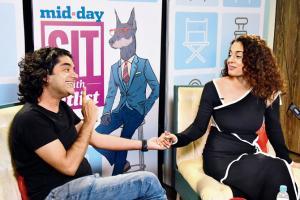
Kangana Ranaut shares a light moment with Mayank Shekhar during the chat
Love/loathe, can't ignore actor-writer-director Kangana Ranaut. Over a career spanning a decade-and-half, as an actor plus public-figure, her sharp tongue has sufficiently matched her creative talents.
And she has box-office numbers to back 'em too. Otherwise it'll be all-talk, which it really isn't. It seems that in a boringly politically-correct world, she basically knows how to give it back, in public. In case, she insists, you've crossed swords with her; and that you'd rather not.
In a conversation lasting much over an hour, Ranaut ran out a good bunch of her contemporaries, questioning their position as role models, given they seemed to her as such over-protected, pampered pieces of shit. The entire video is uploaded on the Internet, and you must check it out when you get the time.
But this excerpt, in keeping with Sit With Hitlist as a series, is mainly about looking deeper into one of the finest stories in show-business. Only natural that we start with:
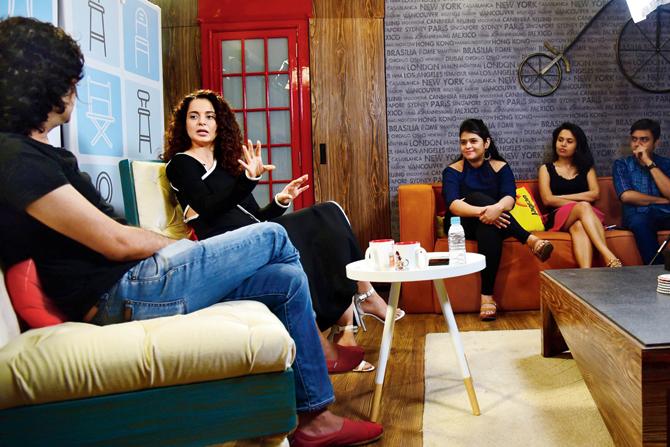
Kangana Ranaut in conversation with Mayank Shekhar at the latest edition of Sit with Hitlist, before a live audience, at the mid-day office Pics/Rane Ashish, Nimesh Dave
Among current Bollywood's leading ladies, you're perhaps the only genuine rags-to-riches story, and have mentioned this before. What do you mean by that?
India is a big hotch-potch land. Back home [in Himachal], growing up in the mountains, I never thought we were any different, or poor, because there is a lot of equality, neutrality there. You will never find something really expensive around. But you won't see a beggar either. It was only when I moved to big cities like Delhi and Mumbai that I was exposed to world's harsh realities. There were slums, and five-star hotels. I still remember entering a five-star lobby: I couldn't believe the sort of luxury/grandeur, and right outside were toddlers begging. It was unsettling for me. According to that economy, I felt that my parents couldn't afford to pay my rent in Delhi. They had their own set of ideas and were scared for me. They had heard horrible stories of girls being misused, turning into porn-stars. The fact is that they couldn't afford to pay Rs 20,000 rent, a big amount 10 years ago.
But that is a common outsiders' perception of showbiz, isn't it?
And that happens commonly as well. I almost fell into a trap like that.
What do you mean?
The fact that people met, and promised to guide, help, but then I was put under house-arrest. And then Pahlaj Nihalani had offered me a film called I Love You Boss. They had a photo-shoot where they gave me a robe to wear, and no undergarments. So I just had a satin robe for a show-girl pose, from which I had to stick my leg out, coming out of darkness.
They should at least have given some tapes. I was supposed to play a young girl lusting after her middle-aged boss. So it was a soft-porn sort of character. And I had this epiphany that I can't do this. I felt like this is exactly what my parents were talking about.
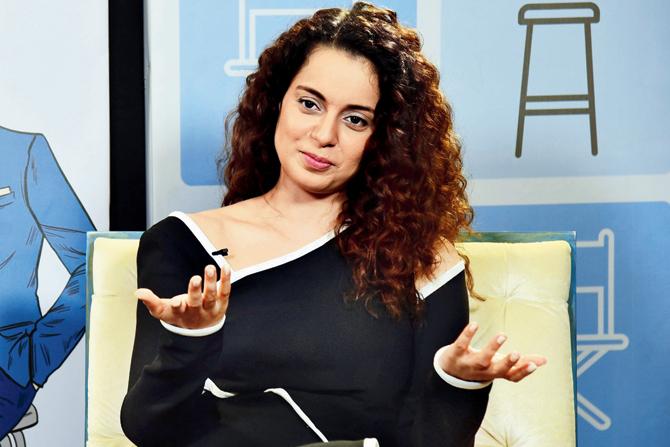
Did you run away, or actually go through it?
I actually went through the photo-shoot, but then I disappeared. I changed my number. And around that time I was giving auditions, and had tested for Anurag Basu's Gangster (2006), and Puri Jagannadh's Pokiri (2006). Luckily I got both films, and had to take the call — you know how something doesn't happen for the longest, and you get two-three things together, I was in that phase! I chose Gangster, but Pokiri went on to become a big hit as well, and then I worked with Puri sir later.
[During the so-called struggle period, working as a model, testing for parts, living in a hostel], did you face anything unsavoury, in terms of what's now called a #MeToo moment?
Not at all. If I have got into trouble like that, it is only because of me!
As in?
I think I have been in places where I have pushed the limit. Like, I have been through dark and destructive phases! Being a teenager, I would get into strange situations that would lead to drastic circumstances—having exposed myself to dangers, and paid a heavy price. And that was because of something more destructive within me, than someone taking advantage of a damsel-in-distress. Fortunately or unfortunately, I've never been that person. At 15, I could tell my father that I don't need to take shit from him. That way, I have been straightforward.
Also Read: Watch Video: Kangana Ranaut in an exclusive interview hits out at Ranbir Kapoor and Alia Bhatt
It's a very teenage thing to do.
Yes, I was young and humiliated by my family, and I felt a sense of longing. It brought about a sense of destruction within me. It seemed relieving, gratifying every time I put myself in those situations. Even by the time I stumbled across a film like Gangster, I felt so bleak and exhausted that it never seemed like something good would happen to me.
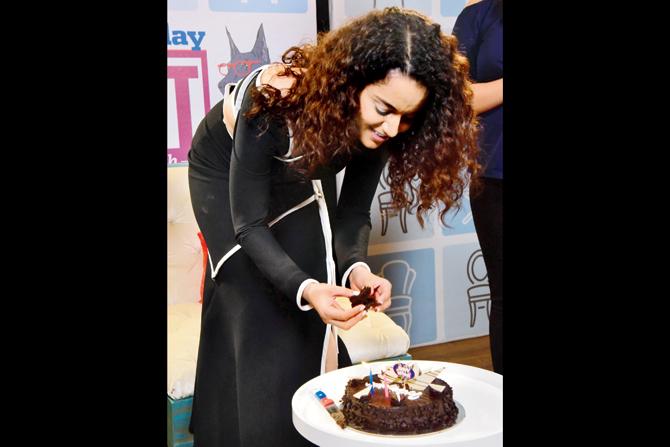
You'd reached a point where you couldn't care less?
Yes. Can't you tell from my performance?
No, thought you were playing a character.
I was 17. I don't think I played any characters in those days. I had [briefly] done theatre [in Delhi] so I could take some instructions, but I wasn't a seasoned actor, who would draw a graph. I was in that situation.
Another thing that sets you apart from your contemporaries is you're the only person from films I know who has never been a movie buff. You didn't even grow up watching movies.
I actually stumbled upon this profession, and my need to find myself was more spiritual, which is what I am exploring at this point. But even earlier, money, fame, and adulation were not the driving factors. You can tell from my choices. I am not on social media, and I have never been a film fan. Even today when I have to watch a film/series to study, or am asked to, it takes a lot of effort. I have to bring in other perks like cook a good meal, wine to accompany; else, it gets too dry. I actually find [film or series] as bit of an external feeding mechanism. You are fed for so long, which I don't like.
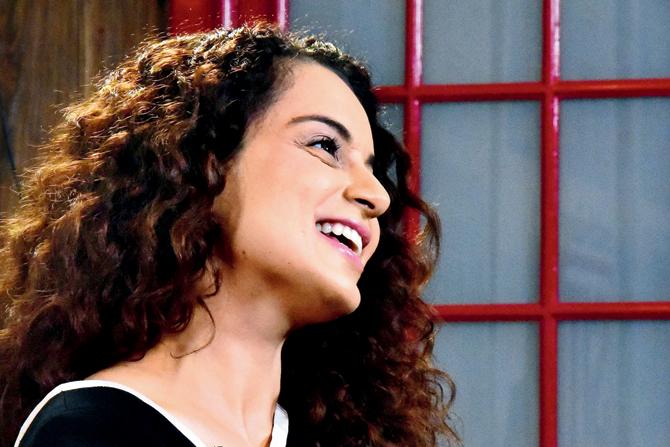
You mean you find the process too passive?
Yes, I miss the engagement that one can have, for example, when you sit with friends. Or do poetry, where you react to stanzas. But with film, there is too much feeding without any involvement, and that goes on for too long! At the same time, there have been rare, gratifying experiences, with wonderful works, where I am so consumed that I have totally surrendered to them.
Speaking of which, there are two big movie moments in your life, Black (2005) and Devdas (2002) — if I'm not mistaken — and both involve Sanjay Leela Bhansali; you've met him since?
Oh, yes. In fact, we had a brief meeting for Padmaavat (2018). He narrated me the script.
He offered you the film?
Yes. There was this conversation, and I was doing Manikarnika then, so it didn't go anywhere. But we had a brief narration. Before that as well, he wanted me to do the Ram-Leela song. He is a filmmaker who can leave strong impressions on you, especially if you are a fresh mind.
I was 13 or 14 when they [friends at Chandigarh hostel] took us to watch Devdas. It is based on literature that I was not exposed to. Along with direction, for the first time, the artiste, thinker, or someone who loves to contemplate, had been seriously seduced.
So the ethos of two extremely strong-headed people [in Devdas] and their egos, meant much more. At that age, I could identify with it. I would cry, and think about life. And, of course, those amazing, grand visuals, and the way he depicted them was poetic, something I'd never seen before.
And then I remember going for Black. At that time, people around me from theatre were suggesting I do films, which I thought would be difficult. I went with my roommate Kamlesh, who was almost my mother's age.
She was also a struggling actor?
Yes, she wanted to do mummy roles. She was around 52-53.
Living in the same [Asha Chandra] hostel as you?
She was from Chicago, had limousines. She is back in her hometown now, but she comes over sometimes, and still says that if a role comes up, I must tell her [laughs]. But that is the charm of films.
So she took me to watch Black, and told me if we could act like that, we could also become like them. And I said, "I can do this. What's the big deal?" She was like, "Oh my god, look at you?" I said in theatre, we do this in one go. Here, you have to do it in segments; and if you mess up, you can do it again! I went back to my hostel, tried to enact [Rani Mukerji's character] before the mirror. And I knew I can definitely do this. That day, I found the confidence.
Also Read: Kangana: Pahlaj Nihalani gave me a photoshoot where I had a robe to wear, and no undergarments
You're a self-taught actor. But when you don't watch movies per se, how did/do you teach yourself? Often people learn from observing others' craft. What's your process?
I wouldn't say I'm a self-taught actor — definitely someone curious and eager to learn. When I did theatre with Arvind Gaur, he opened me up and gave me confidence that I am good at this. When it came to Anurag [Basu], he said, "I have met so many young actors, and some of them I have rejected, are big stars today. But people are often unable to convey what they think and feel. You have this ability to portray that." He had this process: If he gave me an emotion, he would ask me to repeat it [that thought] in my head, and it would reflect on my face.
Give an example.
For instance, if Emraan's [Hashmi] character in Gangster walking towards me and I have to act anxious, he would stop me from verbalising it. He would make me sit still, and repeat the panic words, "What will happen," in my head over and over again. But this can't be applicable to all films. In Manikarnika, it would be difficult, because the film is more theatrical by nature. I have to actually spell out the emotions.
In a film like Queen (2014), it has to be more internal, and less about body-language. There is a different school of acting and you learn a lot with every film. So while I am not self-taught, I do grasp everything and make it my own.
Also, you've mentioned that when you play a certain part, you give your character a one-word adjective. Could you elaborate?
With a character, one can get confused, because people aren't uni-dimensional. But if there is one aspect that you can point out and dissolve yourself in, your job gets easy, and that comes through beautifully on screen. This is a personal style I have developed.
So what was your one word for Manikarnika?
I would be in her sarees, and stand, and say something like, grace, or mother. Every time I said the word 'mother' for her, everything I carried within as an individual would leave me. That cannot be applied to every scene, because there were so many fierce sequences. But overall, she was motherly in her approach. She wasn't Charlie's Angels fierce. She was mother-fierce, desperate-fierce.
One word for your character in Queen?
Vulnerable. It was easy to tap into. [Director] Vikas [Bahl] would say that I'm in fact overconfident. My father thinks the same. But it always excited me to find people who are absolutely unsure of themselves. They look away, even if no one's looking at them. When this character came my way, I was thrilled to go into that zone, identifying such people, and what it feels like to be them.
You actually worked on the writing process of that film, and crafted the character.
This was during the time I was not getting good work, doing films like Rascals (2011). I went off to New York to learn screenwriting. I understand direction, music-process, but writing made me curious. Queen was happening then. Vikas was an unusual director. We would construct scenes on set. He felt that everyone else on set knows more than him. I am the same way, when I am directing. I gave a lot of inputs in Queen — the break-up scene in the cafeteria, the Italian kissing scene, were my ideas. There were a lot of situations suggested by me. When I saw the film finally, I was glad it worked out well together.
You should be glad Queen happened because before that you were almost on the verge of quitting acting, true?
It was the end of my career. Everything was over. And I was doing films that would further harm me. I was doing 10-minute roles, working in the launch-vehicle of a politician's son. I did all of this to sponsor my education in the US.
But you would want to pursue direction seriously? You have directed Manikarnika.
That happened accidentally. Before that, I tried everything to make a project, where I can involve myself more, but it didn't work out. I miss that infrastructure you need. Past directors who have made it are all: 'Kisi bade hero ne unhe bachha samajh ke mentor kiya hai!' Even if it's with guest appearance, they have been backed by mentors. I am not comfortable with that sort of a scenario. A lot of women directors feel that when the boys are out with their beers and gang, a lot of million-dollar deals get cracked. When you are a girl, it is difficult to fit yourself into the environment. Everyone gets uptight and uncomfortable. Somehow boys [between themselves] can get pally, and work it out!
Usually direction, more so production, becomes Plan B for actors, but you're currently at the top of your game.
Directors should be made mainstream heroes like in the West. They are stars like Christopher Nolan is. I don't look down upon filmmaking, or feel it can compromise on my popularity. Also, I don't even enjoy what comes as frills for actors — unnecessary attention, dancing at weddings, fairness-cream endorsements. I want to able to evoke thoughts and ideas through my work. If a story is within me, I want to share it with the world, and live through them. It is spiritual in its nature.
Speaking of spirituality, you're just back from a ten-day break, having not spoken a word in that time. How was that like?
Very difficult.
Also Read: Kangana Ranaut says the leaked horse-riding video was a conspiracy against her
Why did you need that break?
I was kind of harrowed with the whole Manikarnika experience. My director abandoned the project. All of this came on to me with such a force. I wanted to get into direction. But it didn't have to come like a tsunami, at gunpoint — directing in a situation, where everyone is feeling unsure.
When the film finally came out, and came out good, people loved it. But there was so much negativity from the backlog that came with it. I thrive on my confidence. I don't know how to function without it. It's the fuel of my personality. When I feel wronged, taken for a ride, I feel like a meek person. I felt like that.
These people were altogether bullying me. Did you see the horse episode [a clip leaked from the making of the film]? This is mockery. A girl has pulled off these stunts for the first time. And there is this whole system working against it openly? I felt like it was scarring me. I have been associated with a guru's ashram in Coimbatore, and this [retreat] was happening, exactly what I needed.
But as a public figure, you also seem to thrive on this [environment]. Most artistes would want to stay away from cut-throat worldly stuff, but you actually want to pick on someone, and say, "Why is this guy doing this?" Fair?
No. I do that only when I am rubbed the wrong way. I obviously don't have time to pick on people, or find out who's doing what. Also, I am not a judgmental person, and if you see me, I'm very easy-going. But when somebody, on purpose, bullies me or tries to be nasty, then, of course, I have my own way of putting them in their place. And I do that very well.
Googling you before this conversation, the second thing that showed up was, '34 controversial moments from Kangana's life'! Clearly, you rattled people up in a certain way. But is it always because someone rubbed you up the wrong way?
Always. Of those 34 controversies, you [can't] come up with one that hasn't been about people [who haven't rubbed me the wrong way]. Maybe you haven't seen them [do it] openly, in public. Because sometimes people have a way of going behind, and hitting you. But I have always retaliated, openly.
For example, that "silly ex" [comment]... I said it first. But the way he was harassing me for two years... So people are like, 'Oh, where did that [my reaction] come from?' It has always been out of retaliation to people, who have been either secretly harassing/bullying me, or openly so.
Recently you picked on Ranbir Kapoor for the fact that he does not like to comment on stuff which is political in nature, something he said on Sit With Hitlist. He didn't rub you the wrong way?
Of course he did. He said, "I live in luxury."
But he was talking about himself.
These are people who feel absolutely exclusive, saying one has nothing to do with the rest of India. This is the kind of attitude that Karan Johar and gang thrive on. And a lot of negative PR about me has been happening from these people. Maybe you don't know, but I know who gives out news [about me]. That's why whenever I do something; it is to put them in their place.
I am me, and you are you, is where the words 'nepotism', and 'outsider', come from. Because they feel superior to others. We need to question that, and the fact that I also know who had released that horse video. If I tell you the name, you will be shocked.
Also Read: Ranbir Kapoor gets slammed by Kangana Ranaut! Who's next?
Go for it.
I'll you tell later. There is a lot of politics in the industry — people who are uncomfortable with me coming up, whether it is with Tanu Weds Manu (2011), or Manikarnika, which have [box-office] figures that no female-centric films have seen before. Tanu Weds Manu is still ahead of many heroes' highest grossers. And with Manikarnika, people are saying no hero has ever done action like this.
So, it is frightening many people — making them feel, ki hamari bhi period film aayegi, will we be compared? If in your business, journalism, it is not as simple as it looks, then how can it be in mine?
But could you also be suffering from some element of persecution complex? Is it possible, as an idea, thought?
Well, that person will definitely live in a lot of pain, feeling everyone is out to get them. But when you are out to get everyone...
You are out to get everyone.
Obviously, one can't be suffering from [persecution] complex, when I am out to get everyone, who has tried to mess with me. It is, in fact, the opposite of that!
Sure, but there was a larger point that you were trying to make with that Ranbir Kapoor [comment]...
You know I also spoke about other stars.
I know. This isn't about him, but the larger idea that if one feels they aren't qualified enough to comment on something, or don't wish to go public with it, is that not okay as a personal choice? Do we not owe to society that we pay our taxes, and we do our work really well? Is that not good enough?
This cannot be spoken of superficially. Can you and I plough [the field] for ourselves? No. You write. I act. There is somebody actively farming for us. And so we eat. You hire these people to work for you, but you can't possibly educate them from Day One. But there are people in the social structure [dealing with it only as] a give-and-take. We can never pay back a farmer for what he does for us.
Now, what is a celebrity? A celebrated human being, who reflects [on] what the masses [want]. Maybe they [the masses] don't even know what is good for them. That responsibility, of reflecting on that psyche, lies on them [the celebrities]. Hence going forward, they should be addressing concerns, if we are talking about the collective development of a community, or nation.
If it's just about capitalism, that's different — you do your thing, and I do mine. It will be good to talk like that, maybe 50 years down, when we don't have the highest [levels of] malnutrition in the world. Right now, if somebody talks like that, they should be condemned.
As a society, we need to decide whether these idiots should be our role-models, because we get what we deserve. So we need to talk about it. They can make as much money as they want. That's not the problem.
Also Read: Kangana Ranaut to be paid a whopping 24 crore for Jayalalithaa biopic?
Sure, that's a viewpoint. He's allowed his. You may not agree with it. But that's how he feels. You should be okay with that too.
It's not okay.
(Audience) You called out the industry for being nepotistic. Here's a scenario, say 20 years down, your child tells you that he wants to be an actor/director, will you not pick up the phone and help? (Eepsita Guha)
If I do that, the possibility of him being a good director will be 50 per cent. If I really care for him as a mother, I will let him find his own way, because he can make a good living out of anything, anywhere. But if I want him to be an extraordinary person, I must throw him into the sea. He will either drown or make it.
My brother is struggling to be a pilot past four years, looking for a job. I can make a call and make that happen, but never will. Getting him that job means nothing to me. But to see a great human being rise out of that struggle, every day — through rejection, despair, hopelessness — is what I would really love to see my brother as.
For him there are plenty of options, farming is also one. We have lot of land back home. It is not cheque, money, or just badges we wear to become director, pilot, or doctor. That is not how I see life.
(Audience) Is production something you're actively looking at? [Mohar Basu]
It's something I might have to get into, reluctantly. As an actor, I get a lot of freedom on set. But as director, there were many things that people tried to do with my film — like the CEO and others; they tried to edit behind my back. And they could.
Everything that a director does is questioned by people who've never directed. Or have no filmmaking experience. But they are in positions they can.
As a creative person, I come from a place that is not borrowed, because I've never seen films. So my path seems unconventional. But that doesn't mean you [decision-makers in a company] just discard it, since it has never happened before. I've gathered that a producer can only conceive or perceive from the position of being cinema buff/fan. If you show anything they are fans of, they'll immediately okay it. Anything original, they can't perceive. In that scenario, I might have to produce, even if I hate to do baniyagiri [handling money].
(Audience) Why are you not on social media? And when is Tanu Weds Manu 3 getting made? [Alam Khan]
Aanandji [Rai, director, Tanu Weds Manu] is making another film right now; so maybe after that. He and I spoke about it. And I'm not on social media, because it is very consuming. I like to be involved in everything I do. My very need [as an actor] to live within people, and say something, and live through them, is very spiritual. But when I communicate with people, it just dies down. I lose that need. Don't know how to say it.
Social media is quite satisfying. For example, if I have a story to tell, I can say it in five scenes. But if I write two lines of poetry, it will be the same thing. So, I feel if I'm on social media, I'll be writing poetry, constantly giving opinions, posting pictures, contemplating, writing things that I always wanted to say through cinema. And then there will be nothing left for me to say.
Interesting, you're conserving yourself for art/films.
Sometimes I give a good interview, and feel like there's nothing to do or say for seven days. That need to communicate dies down, because I feel I'm very good with communication, photography, poetry...
You write poetry?
Yes, and even so many dialogues I write, which do well [on screen] only because I've not communicated those thoughts before. And I don't know how people keep themselves full with creative juices, when they're engaging with millions. Either they're [being] fake, or they [know how to] save themselves, draw the line. How do they not get enamoured by other people and [their] wonderful lives [on social media]?
Also Read: Kangana Ranaut on Jayalalithaa biopic: Will learn Tamil to feel closer to her
Catch up on all the latest entertainment news and gossip here. Also download the new mid-day Android and iOS apps to get latest updates
 Subscribe today by clicking the link and stay updated with the latest news!" Click here!
Subscribe today by clicking the link and stay updated with the latest news!" Click here!







